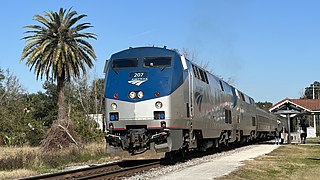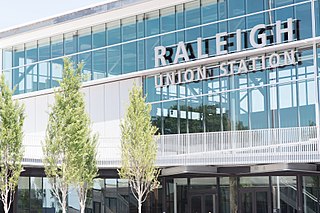
The Seaboard Coast Line Railroad was a Class I railroad company operating in the Southeastern United States beginning in 1967. Its passenger operations were taken over by Amtrak in 1971. Eventually, the railroad was merged with its affiliate lines to create the Seaboard System in 1983.

The Seaboard Air Line Railroad, which styled itself as "The Route of Courteous Service", was an American railroad that existed from April 14, 1900, until July 1, 1967, when it merged with the Atlantic Coast Line Railroad, its longtime rival, to form the Seaboard Coast Line Railroad. Predecessor railroads dated from the 1830s and reorganized extensively to rebuild after the American Civil War. The company was headquartered in Norfolk, Virginia, until 1958, when its main offices were relocated to Richmond, Virginia. The Seaboard Air Line Railway Building in Norfolk's historic Freemason District still stands and has been converted into apartments.

The Silver Meteor is a long-distance passenger train operated by Amtrak between New York City and Miami, Florida. Introduced in 1939 as the first diesel-powered streamliner between New York and Florida, it was the flagship train of the Seaboard Air Line Railroad (SAL) and one of the flagship trains of its successor, the Seaboard Coast Line Railroad (SCL). The train was transferred to Amtrak when it took over intercity passenger rail service in 1971.

The Silver Star is a long-distance passenger train operated by Amtrak on a 1,522-mile (2,449 km) route between New York City and Miami via Washington, D.C., Richmond, Virginia, Raleigh, North Carolina, Columbia, South Carolina, Savannah, Georgia, Jacksonville, Florida, and Tampa, Florida. The Silver Star and its sister train in the Silver Service brand, the Silver Meteor, are the descendants of numerous long-distance trains that operated between Florida and New York for most of the 20th century.

Richmond Main Street Station, officially the Main Street Station and Trainshed, is a historic railroad station and office building in Richmond, Virginia. It was built in 1901, and is served by Amtrak. It is also an intermodal station with Richmond's city transit bus services, which are performed by Greater Richmond Transit Company (GRTC). The station is colloquially known by residents as The Clock Tower. It was listed to the National Register of Historic Places in 1970, and in 1976 was made a U.S. National Historic Landmark. Main Street Station serves as a secondary train station for Richmond providing limited Amtrak service directly to downtown Richmond. Several Amtrak trains serving the Richmond metropolitan area only stop at the area's primary rail station, Staples Mill Road which is located five miles to the north in Henrico County.

The Ocala Union Station is a bus station and former train station in Ocala, Florida, United States. It is located at 531 Northeast First Avenue, and was built in 1917 by both the Atlantic Coast Line and Seaboard Air Line Railroad. Prior to this, ACL and SAL had separate depots in Ocala. The former ACL station was originally built by the Florida Southern Railroad, while the former SAL station was built by the Florida Transit and Peninsular Railroad. On December 22, 1997, it was added to the U.S. National Register of Historic Places.

The Naples Seaboard Air Line Railway Station is a historic Seaboard Air Line Railway depot in Naples, Florida. It is located at 1051 5th Avenue, South.

Charlotte station is an Amtrak station located at 1914 North Tryon Street, about 1.5 miles (2.4 km) to the northeast of Uptown Charlotte. Owned by Norfolk Southern, it is located near that railroad's yard outside Uptown.

Hamlet station is an Amtrak train station in Hamlet, North Carolina, United States. The station is located within the Main Street Commercial Historic District and is in walking distance to the National Railroad Museum and Hall of Fame.

Camden station, also known as the Seaboard Air Line Railroad Depot, is a train station in Camden, South Carolina. It serves Amtrak, the national passenger rail service. The station was built by the Seaboard Air Line Railroad in 1937. It is located on 1100 West DeKalb Street, although some sources give the address as being at 1060 West DeKalb Street. Either way, it was named to the National Register of Historic Places in 2000. The station is in disrepair, and a renovation project is scheduled to commence in August 2014. The station renovations were completed in early 2016.

Florence station is a train station in Florence, South Carolina, United States served by Amtrak. It is currently served by the Palmetto and Silver Meteor routes, and is a service stop for the Auto Train.

Kingstree station is a train station in Kingstree, South Carolina, operated by Amtrak, the United States' railroad passenger system. It was originally built by the Atlantic Coast Line Railroad in 1909. The station survived the merger of the Atlantic Coast Line and Seaboard Air Line Railroads into the Seaboard Coast Line Railroad in 1967, only to terminate passenger service in 1971. Amtrak service to Kingstree began on June 15, 1976, with the introduction of the Palmetto. The station is currently part of the Kingstree Historic District.
The North Charleston Intermodal Transportation Center is an intermodal transit station in North Charleston, South Carolina, United States. It serves as the Amtrak train station for the Greater Charleston area as well as a bus terminus for the Charleston Area Regional Transportation Authority (CARTA) and Southeastern Stages, a regional intercity bus common carrier. The street address is 4565 Gaynor Avenue, and is located in the Liberty Hill neighborhood.

Sebring station is a train station in Sebring, Florida, United States. It is currently served by Amtrak, the national railroad passenger system. Located on East Center Avenue, the station was constructed in 1924 by the Seaboard Air Line Railway. Approaching the transfer of passenger services to Amtrak, the station was used by the Seaboard Coast Line Railroad for the Silver Meteor,Silver Star and the Palmland. The latter train ended in 1971, while the Silver Meteor and Silver Star remain operated by Amtrak to the present. Amtrak trains formerly using the station included the Floridian,Palmetto,Sunset Limited and the short-lived intrastate Tampa-Miami Silver Palm service.

Raleigh Union Station is an intermodal transit station in Raleigh, North Carolina, United States. Train service began the morning of July 10, 2018. Its main building serves as an Amtrak train station, while a future adjacent building will serve as the bus terminus for GoTriangle. The station is located at the Boylan Wye, a railroad junction used by CSX and Norfolk Southern, and adjacent to the Depot Historic District in downtown Raleigh.
The Atlantic Coast Line Railroad was a US Class I railroad from 1900 until 1967. The following former and active train stations were previously used by the Atlantic Coast Line Railroad. Many of them are listed on the National Register of Historic Places.

Seaboard Coast Line Railroad station is a former freight railway station in St. Petersburg, Florida, which has been designated by the city of St. Petersburg as a local landmark. The structure is located at 420 22nd Street South.

The Champion was a streamlined passenger train operated by the Atlantic Coast Line Railroad and Florida East Coast Railway between New York City and Miami or St. Petersburg, Florida. It operated from 1939 until 1979, continuing under the Seaboard Coast Line and Amtrak. It was a direct competitor to the Seaboard Air Line Railway's Silver Meteor, the first New York-Florida streamliner.

St. Petersburg station was a passenger train station in St. Petersburg, Florida. Located northwest of downtown, its former address was 3601 31st Street North, though access to the site is now only from 37th Avenue North.

The Seaboard–All Florida Railway was a subsidiary of the Seaboard Air Line Railroad that oversaw two major extensions of the system in the early 1920s to southern Florida on each coast during the land boom. One line extended the Seaboard's tracks on the east coast from West Palm Beach down to Fort Lauderdale and Miami, while the other extension on the west coast extended the tracks from Fort Ogden south to Fort Myers and Naples, with branches from Fort Myers to LaBelle and Punta Rassa. These two extensions were heavily championed by Seaboard president S. Davies Warfield, and were constructed by Foley Brothers railroad contractors. Both extensions also allowed the Seaboard to better compete with the Florida East Coast Railway and the Atlantic Coast Line Railroad, who already served the lower east and west coasts of Florida respectively.























